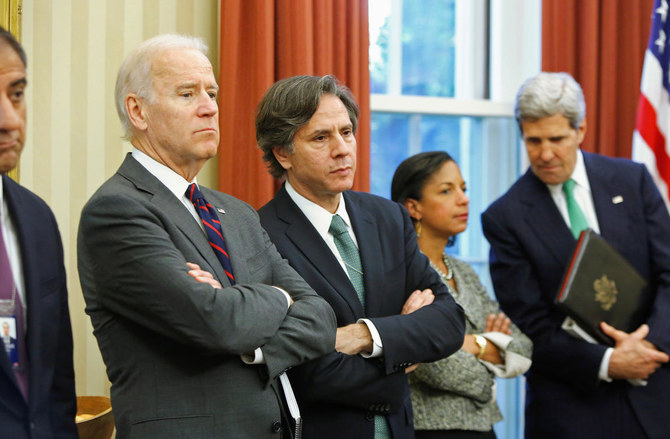Blinken pick shows Israel that little will change under Biden
https://arab.news/pbvnt

Right-wing Israeli Prime Minister Benjamin Netanyahu has nothing to worry about, as the man who will handle America’s foreign policy during Joe Biden’s presidency is a loyal friend of Israel. Crisis averted.
President-elect Biden’s nomination of Antony Blinken as his secretary of state was a masterstroke, according to the Biden campaign. Blinken is a State Department veteran, a strong believer in a US-led Western alliance and a true friend of Israel. The immediate message that Biden wished to communicate through this particular pick — and also the naming of Jake Sullivan as the US’ next national security adviser — is that the US will edge back to its default position as a global leader and away from Donald Trump’s “America First” foreign policy agenda.
While the Europeans are excited to have their American benefactors back, Blinken’s appointment seems geared toward appeasing Israel. The defeat of Trump in the Nov. 3 election led to much anxiety in Washington and Tel Aviv. The Israelis were nervous that Trump’s proposed peace plan, which was essentially an American acquiescence to all of Israel’s demands, would be shelved. The Biden administration, meanwhile, remains wary of the contentious relationship Netanyahu had with the last Democratic administration under Barack Obama.
The selection of Blinken to fill the role of America’s top diplomat must have been considered within several political contexts. Firstly, Israel needed an immediate reassurance that Biden would carry on with Trump’s legacy. Secondly, the next secretary of state needed to match the love of Israel expressed by the departing Mike Pompeo. And, thirdly, the Iran nuclear program file has to be handled with the utmost sensitivity. Not only did Biden succeed in making the most opportune selection, but the Israelis are also absolutely delighted. Israeli leaders from all the main political parties have welcomed Biden’s selection, declaring unanimously that Blinken is “good for Israel.”
Pro-Netanyahu politicians are particularly happy and eager to engage with a Blinken-led US foreign policy. Dore Gold, a close Netanyahu associate who has served as Israel’s Foreign Ministry director-general, told Haaretz he was “impressed” with Blinken and “found him to be very professional and a good listener.” Unlike the “simply difficult” attitudes of other officials in the Obama administration, Gold found Blinken to be “very open” and without “any kind of anti-Israel undertone.”
Other Israelis share the same sentiment, reflecting a collective understanding that Biden will not reverse any of the significant steps taken by his predecessor. Former Foreign Minister Tzipi Livni expressed her optimism regarding the direction of US-Israeli relations. Like most Israelis, she had no qualms with the Trump-Pompeo generosity and is now certain that Biden and Blinken will be equally benevolent toward Israel.
While Israelis are reassured by the realization that Biden is unlikely to reverse any of the pro-Israel measures taken by the Trump administration, the Palestinian leadership seems oblivious. After speaking to Palestinian officials, Time magazine summed up the Palestinian Authority’s expectations as merely relating to technical and diplomatic gestures, such as the reopening of the Palestinian mission in Washington, the establishment of a new US Consulate for Palestinians in East Jerusalem, and the restoration of funding.
The Palestinians’ inability to appreciate the nature of the looming challenge was also reflected in the political discourse of the Arab members of the Israeli Knesset. Ayman Odeh, the leader of Israel’s large Arab political coalition, concluded that Biden would take the Trump peace plan “off the table.”
While it is true that Biden is unlikely to borrow any of Trump’s divisive terminology, he will certainly keep the spirit of his predecessor’s peace plan alive. Trump’s proposal consisted of specific US measures aimed at validating Israel’s illegal claims over East Jerusalem, the West Bank and the Golan Heights, as well as delinking the Arab normalization with Israel from the subject of the Israeli occupation. None of this is likely to change, even if some of Trump’s terminology is scrapped.
This conclusion does not completely rule out the possibility of a future clash between Tel Aviv and Washington. However, if a disagreement does take place, it will not be over Israel’s illegal actions in Palestine, but rather the likelihood that the US will restart talks with Iran regarding its nuclear program.
Pro-Netanyahu politicians are particularly happy and eager to engage with a Blinken-led US foreign policy.
Ramzy Baroud
On Iran, Netanyahu’s message to Biden was decisive and undiplomatic. “There can be no going back to the previous nuclear agreement,” the Israeli PM warned on Nov. 22. With that warning in mind, Blinken will find it extremely difficult to quell Israeli fears that, by diplomatically engaging with Iran, the US will be abandoning Tel Aviv. American assurances to Israel are thus likely to come at the expense of Palestinians: A free Israeli hand in expanding illegal settlements, yet more cutting-edge American weapons, and unconditional US support at the UN.
Biden’s Israel-Palestine policy is likely to be a continuation of Trump’s, but under a different designation. It is baffling that the Palestinian leadership is unable to see this and chooses to instead focus on steering the US back to a failed state of affairs where Washington blindly supports Israel while paying the Palestinians off for their silence.
- Ramzy Baroud is a journalist and the Editor of The Palestine Chronicle. He is the author of five books. His latest is “These Chains Will Be Broken: Palestinian Stories of Struggle and Defiance in Israeli Prisons” (Clarity Press, Atlanta). Twitter: @RamzyBaroud









































